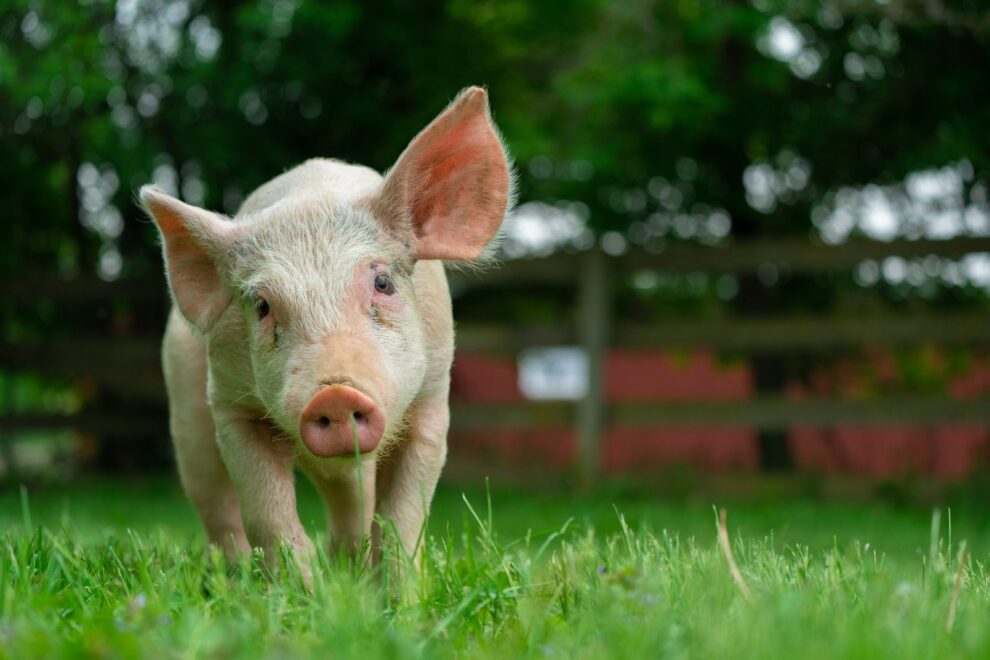On Sunday, a Peru, Massachusetts farm sanctuary is taking part in New England VegFest in Worcester.
“A farm sanctuary at its very basic level is bringing in animals that were previously products in commerce and letting them live out their lives as individual beings,” volunteer Michael Rivkin explained to WAMC.
Tucked into the hilly eastern fringe of the county, Berkshire Farm Sanctuary opened its doors in 2019 on a plot of land just off Route 143.
“The previous owner had barns up, had fences up, and had a home on that property,” Rivkin said. “But at the point in time when Berkshire Farm Sanctuary took it over, it was in need of quite a bit of TLC. So, we’ve been working on fixing up the barns, fixing up the fencing, and right now, we have two barns that are livable for animals. They house 11 sheep, two goats, four pigs – will be five soon – and two chickens that we’re fostering as they head off to another sanctuary. You’ll see a big red barn in classic New England style, and some areas for grazing for the animals, a paddock for the for the pigs, and a very beautiful farmhouse.”
Rivkin, a lawyer, began volunteering with the organization in 2021.
“I think it’s very funny to go from an individual such as myself, who has been a vegan for a number of years, who has been passionate about animals, but someone who never touched dirt until they were 25,” he told WAMC. “I did not have any sort of farming experience, I didn’t really have much of an experience with animals beyond your household pets. So, when you’re an individual such as myself, and you look on Instagram or Facebook, you see a number of videos of goats and sheep and pig just having a great time, as if they’re dogs or they’re some other household animal. And while that may be true of certain individuals, such as Beanie – one of our goats, who is just the sweetest individual to have ever lived – there are other animals that have a more specific personality, much as any other individual.”
The sanctuary’s pig roster is about to make a major new addition.
“We are bringing in a fifth pig who is currently off site who we do have within our roster of rescued animals, M’lady,” said Rivkin. “She is a Yorkshire, so she’s a much larger pig. I believe she’s in the 600-pound range. And I don’t think you can really appreciate the size of a pig until you get in a room with one. They’ve got some gravitas.”
For Rivkin, the early mornings he’s spent tending to the animals’ needs on weekends have become a valuable part of his life in the Berkshires.
“The obvious, immediate, and positive reaction is, it’s fantastic. Animals rock, that’s why we spend time with them, that’s why we love them, that’s why people get pets,” he said. “Animals are- They’re an innocent, purely emotional entity that needs love and needs support. And they oftentimes give you that love and support in multiples back. So having the opportunity to form a bond with an animal, be it a sheep or goat or a pig, it’s fantastic, it’s exciting, and it’s just great to be around them.”
As with many nonprofits, Rivkin says the devastating impact of the COVID-19 pandemic so early on in the sanctuary’s development has left it in dire need of support.
“2019 was a tough time for a lot of things to start,” he said. “And that has been the case for us, in that sanctuaries and a lot of volunteer-driven organizations thrive when there’s a lot of visibility. It’s been a little bit tough for us to get that under the circumstances, so we’re doing what we can to try and bring people out, get the word out and let them know about Berkshire Farm Sanctuary.”
To that end, Rivkin and other volunteers are traveling to one of the region’s largest events for animal rights advocates on Sunday to spread the word.
“We’re going to New England VegFest, which has been going for about 10 years now,” he told WAMC. “It’s a yearly festival. Every time that I’ve gone it’s been in Worcester, which is case this year as well. And a number of vendors, exhibitors, and organizations come to share their message, their products, their vision of a future that includes less subjugation of animals.”
Rivkin says the goal is to share Berkshire Farm Sanctuary’s mission in one of the commonwealth’s most remote and economically challenged regions to a larger audience.
“The things that motivate and the things that drive engagement and donations are the rescuing of more animals,” he told WAMC. “And while that is obviously the goal of almost every sanctuary, that becomes a tough path to follow sustainably. You can only, hopefully, rescue animals that you can afford to take care of for the rest of their lives. So there’s this difficulty, there’s this tension in continuing to rescue animals, which causes an increase in funding and fundraising, and then to support those animals, you need to rescue more animals so that you can get more funding in. That’s a tough way to continue and to grow. Berkshire Farm Sanctuary, one of the reasons why I’m so passionate about this sanctuary in particular, we only bring in the animals that we know that we can give a happy life to for the rest of their life, however long that is. So, we are not rapidly, rapidly, rapidly adopting more and more animals, we’re slowly doing it as we’re able to grow organically and sustainably. So, the goal in going to VegFest is to get more people aware of Berkshire Farm Sanctuary, encourage them to come out, because it’s a great spot and we’ve got friendly people there, we’d be happy to show you around, and hopefully, get some more people involved. Any passionate volunteers that may be interested in spending a couple hours a week spending time with animals, learning some skills on a farm, and just looking to get out in the outdoors. I know I work at a desk during the week, so having the opportunity over the weekend to get my hands dirty and work hard is a welcome opportunity.”
One of the sanctuary experiences that’s made the greatest impact on Rivkin was the first time he helped shear sheep.
“When the sheep is shorn, it’s not a pleasant experience for them, it’s traumatic,” he said. “And it needs to be done. Otherwise, they would have their, their wool would overtake their body, they would not be able to live under those circumstances. But they’ve been genetically bred such that they produce more and more wool to the point that they cannot shed that naturally, so we need to intervene. So, having the opportunity to get in there and really see what it means to create wool, meaning the sharing of sheep, and to understand that this is not someone getting a haircut, this is something that’s a lot more than that, and for a lot of sheep a lot more traumatizing experience- It solidifies existing beliefs that I have that animals should not be merely a product in commerce, but should be viewed as individual living beings that are worthy of respect and should be treated kindly.”
Source : WAMC











